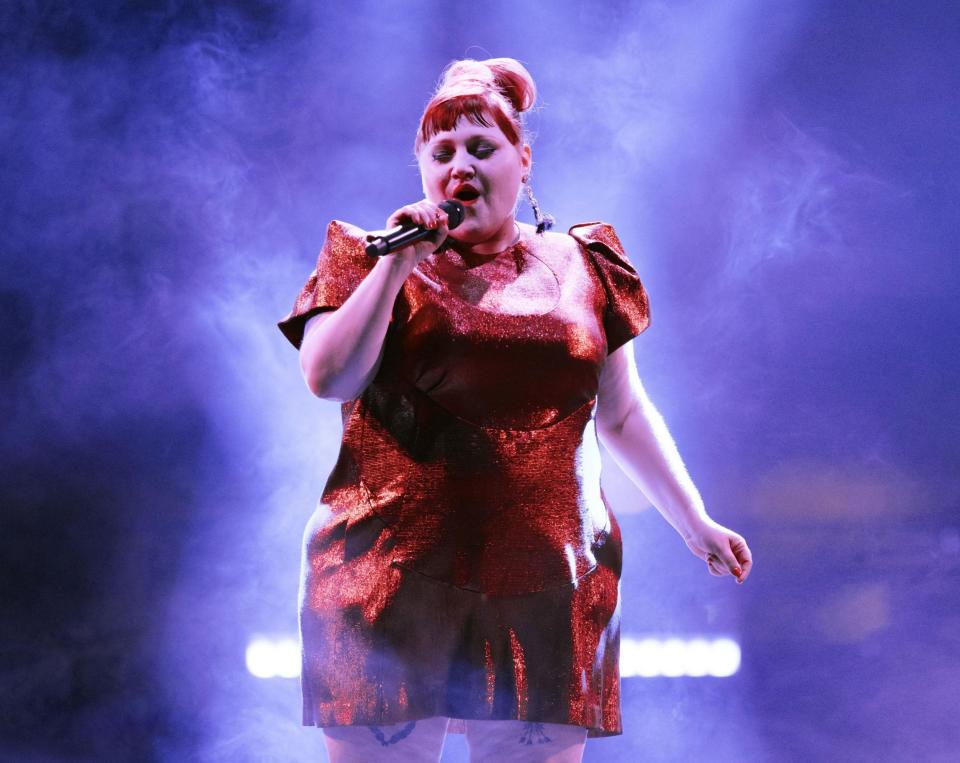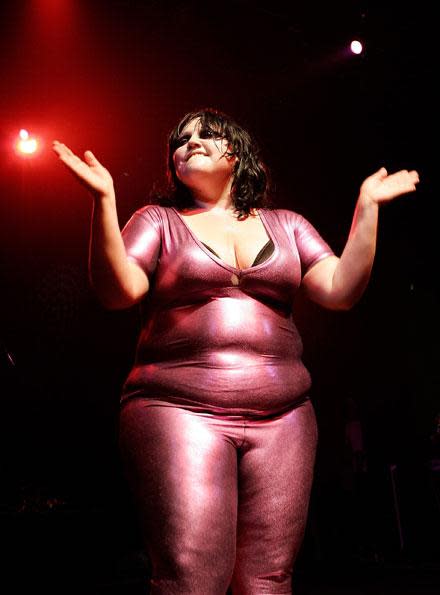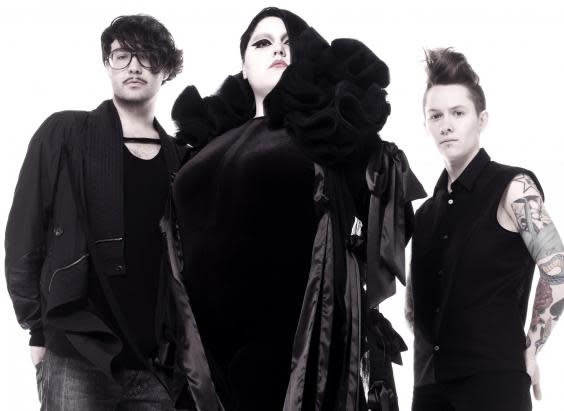Beth Ditto: ‘Taylor Swift’s gay anthem? I was like, thanks, straight white girl…’

I wasn’t supposed to be on the cover of a magazine,” Beth Ditto begins. “I wasn’t supposed to be nude. And I wasn’t supposed to be sexual.”
The Gossip frontwoman, solo artist and actor is talking about the time she posed nude for the cover of NME in 2007, then again for the first ever cover of Love magazine in 2009. The latter was the same year her band – formed in Washington after its three members became acquainted in their hometown of Arkansas – released Music for Men, the follow-up to their 2006 breakthrough album Standing in the Way of Control.
At the time, Ditto had emerged not only as a powerhouse singer, whose belting trills drew comparisons to Etta James and Janis Joplin, but as an LGBT+ icon and early pioneer for what is now known as the “fat positivity” movement. For many, it was the first time a woman in the public eye had embraced her size without apology, without excuses and without shame.
“I feel proud that I got to represent this very DIY – not just body positivity, but fat positivity – moment,” says the 38-year-old. “It’s such a thing now – Lizzo is everywhere, she had a full page in Vogue...”

Yet Ditto never set out to break new ground. She was inspired by the feminist queer punk scene, where talking about issues such as body image and sexuality was second nature. “I’ve been half-naked and wearing whatever I wanted forever,” she says, “so it was always surprising when people were surprised.”
What she is surprised about is just how long it’s been since the release of Music for Men, their Rick Rubin-produced major-label debut that added glitz and stomp to their lean, distorted post-punk sound, with Ditto warbling like a latex-clad Elvis Presley. Our conversation actually takes place as Gossip’s reunion tour, celebrating 10 years since the album first came out, comes to an end, and shortly before the launch of a new series, On Becoming a God in Central Florida, in which Ditto stars. Sat in her hotel room in Amsterdam, she sounds exhausted – stifling the odd yawn – and slightly detached as she speaks about that record, almost as though it happened to someone else. Yet words tumble out of her in that charred Southern drawl.
“Ten years ago, Jesus,” she says. “With some of those songs it’s like going back and reading a journal you wrote... it can be a little cringey. But I don’t think I should ever be the person to judge what I do.”
She reveals she wanted to leave “Heavy Cross” – Gossip’s biggest song (it has 42 million streams to 17 million for “Standing in the Way of Control”) – off Music for Men, because she “didn’t think it was that interesting”. It was lucky they didn’t: the single made the top 40 in the UK upon release and broke a chart record in Germany as the most successful internationally produced single of all time. Then it had a second coming in 2012, when it was used in a Dior perfume advert that starred Charlize Theron and CGI incarnations of Marlene Dietrich, Grace Kelly and Marilyn Monroe. “My life would have been completely different had we not included that,” Ditto laughs. “So that’s why I don’t think I’m the right person to decide those things.”
She made a disarming comment in another interview where she admitted it was only recently that she considered herself an integral part of Gossip. “I try not to have an ego because I don’t think it’s safe,” she says. “I don’t think I let myself feel the best parts of my life... I only feel them retrospectively because I’m coming from a punk ethos, where I think you don’t acknowledge success in the moment.”
Being back with Gossip has been strange, she says, because all the band’s old quirks, all the hang-ups, are exactly the same as before. I ask what it was like to reunite with Nathan “Bruce Paine” Howdeshell, her lifelong best friend and Gossip co-founder. It was Howdeshell who split the band when he decided to relocate back to Arkansas and the farm he grew up on, after becoming a “born again” Christian. In a 2017 interview with The Guardian, Ditto compared it to a “creative death”, like “watching your friend relapse”. Now she says her relationship with him is akin to that with a distant relative, in that they are “super-close in a very strange, unspoken way”.
“We keep it very surface level,” she says. “It’s an old friendship, and people change and evolve. I think I was having a lot of anxiety about the idea of being around him and getting back together. He was getting married while I was getting divorced, which felt weird. But he is who he is, and we’ve always had different interests and some that overlap. I can’t explain it.” You can almost hear the shrug: “It’s just life.”

The divorce she refers to was with Kristin Ogata, her best friend from school whom she married in 2013 in Hawaii, then again in 2014 when marriage was legalised in their home state of Oregon. Their split was confirmed in 2018, and Ditto has now been in a relationship with trans musician and animator Ted Kwo for about a year. She sounds blissfully happy when she tells me about him: “It’s so awesome, and he’s fantastic,” she says. “I feel like I might be in my first adult relationship. There’s a lot of trust, and he knows himself really well.”
Reflecting on her marriage to Ogata, she says they were “really old friends” but “not good partners”. “It wasn’t an easy relationship because it almost wasn’t meant to be romantic,” she says. “I think there’s this thing with comfort that comes with an old friendship that can be mistaken for romantic love, and actually you just wanna be taken care of.
“A romantic relationship comes with a lot more than a friendship does,” she continues. “Friends can hang up the phone and not speak for months... you can’t do that when you’re married! Me and Kristin used to go for months without talking to each other because we’d get on each other’s nerves.”
When Ditto first revealed they were dating, she said that Kwo had urged her to consider how she might be treated differently if people perceived her as a straight woman. “Straight privilege is wild,” she says. “It’s very interesting, being treated completely differently in public is something I hadn’t experienced since high school. I’m really proud of Teddy because he’s an openly trans man who talks about his experience.”
Regardless of whether some people might assume she’s a straight woman, Ditto is very much an LGBT+ icon (“Oh, DARLIN’!” she exclaims delightedly when I tell her this). Recently a debate has opened up about gay stan culture, with some criticism of the misogyny, possessive language and body-shaming that can creep into what is otherwise a joyful celebration of female pop icons. Ditto is, understandably, sympathetic to those men who grew up unable to publicly express their love for Kylie, Madonna or Britney Spears at the height of their fame.
“It’s a really difficult place right now, to be queer,” Ditto says. “I know those gay men and they can be really possessive. Male privilege can come into play, but there was much suffering in their childhoods, and these artists saved them. It was a secret world for a lot of gay people – like for me I thought Cyndi Lauper was my real sister because she made so much sense to me. I saw myself in her, and I really attached myself to this idea of her.”
It’s a long conversation, she concedes, because of the risk of being misunderstood and her own reluctance to exclude anyone.
“There’s so much bulls*** going on in queer culture that right now [the debate about misogyny in gay stan culture] doesn’t mean that much to me,” she decides. What does bother her, she says, is the “pink pound” – “a whole market deliberately aimed at gay men to take their money.”
“That’s what Taylor Swift did,” she says, aiming straight for the single “You Need to Calm Down”, with its “shade never made anybody less gay” sentiments. “I was like, great anthem... straight white girl? Cool, thanks. Released just in time for Pride! I wonder where the proceeds are going for that, you know? That’s the thing that bothers me about it.”
I point out that Swift did in fact donate $113,000 (£92,500) to a charity to help fight anti-LGBT+ bills in Tennessee, and wrote a letter to Republican senator Lamar Alexander urging him to protect LGBT+ rights.
“She did? She is doing that?” Ditto asks. “Good, she should! Especially if you’re releasing a song like that. That makes me happy, I’m glad she’s doing that.”
She’s more ambivalent about Swift’s video for “You Need to Calm Down”, which drew some additional controversy for its representation of bigoted people via a group of rednecks waving homophobic signs. Ditto, who played a redneck woman inspired by her own aunts in Gus Van Sant’s 2018 comedy drama Don’t Worry, He Won’t Get Far on Foot, has spoken on several occasions about the misconceptions surrounding southern women.

“It gets very academic very quickly, doesn’t it?” she says. “And I never went to college, so I don’t even f***ing know. My mum used to say when we were growing up, ‘You’re poor, you’re not stupid.’ And when you do equate being poor with being ignorant, I think that is when it gets insulting.”
Her next project, On Becoming a God in Central Florida, has her acting opposite Kirsten Dunst in the Showtime series about Krystal Gill, a waterpark employee who cons her way into a pyramid scheme cult to get back at the people who ruined her family.
“I play her neighbour,” Ditto explains. “I think it’s pretty similar to my real character, in my mind she loves babies and is a family person... she’s quite naive, she’s a southern lady.”
Ditto, who grew up in a family of Democrats, mentions her plans to get into the studio for some new solo music but also a desire to take part in activism. “I feel like things are so surreal and corruption is so blatant that I don’t know who to trust,” she says.
“I felt I put more faith in people than I should have. My ex used to say I was naive. But you have to give everybody a chance!”
On Becoming a God in Central Florida launches on Showtime on 25 August
Read more
Rapsody's album Eve is a compelling, masterful tribute to black women
Read an extract from Taylor Swift's diary in March 2009
On Lover, Taylor Swift is an artist excited to be earnest again

 Yahoo News
Yahoo News 